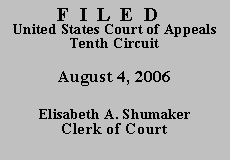

UNITED STATES OF AMERICA,
Plaintiff-Appellee,
v.
JOSEPH CHRISTOPHER SORIANO,
Defendant-Appellant.
Before KELLY, McKAY, and
LUCERO, Circuit Judges.
After examining the briefs and appellate record, this panel has determined
unanimously to honor the parties' request for a decision on the briefs without oral
argument. See Fed. R. App. P. 34(f). The case is therefore submitted without
oral argument.
Appellant pleaded guilty to the charges of (1) felon in possession of a firearm and (2) possession of a firearm not registered in the National Firearms Registration and Transfer Record. He was sentenced to eighty-four months' imprisonmentthe low end of the applicable advisory guideline range. Appellant argues that the district court erred in denying him a downward departure in the form of a mitigating role adjustment.
We review the denial of a reduction for a mitigating role in the offense for clear error. United States v. Chavez, 229 F.3d 946, 956 (10th Cir. 2000). A defendant has the burden of proving by a preponderance of evidence that he is entitled to a reduction pursuant to United States Sentencing Guideline § 3B1.2. United States v. Onheiber, 173 F.3d 1254, 1258 (10th Cir. 1999). The sentencing guidelines permit a district court to decrease a defendant's base offense level for minor participation if the defendant's role in the offense makes him "substantially less culpable than the average participant." U.S.S.G. § 3B1.2, App. Note 3(A). Because the application of § 3B1.2 is heavily dependent upon the facts of a particular case, substantial deference is afforded to the district court's assessment. See United States v. Donaldson, 915 F.2d 612, 615-16 (10th Cir. 1990).
However, § 3B1.2 does not apply to a person convicted for his own possession of a firearm. It states plainly: "This guideline is not applicable unless more than one participant was involved in the offense." U.S.S.G. § 3B1.2, App. Note 2. Appellant cannot point to a "participant" in his two possession offenses except himself. No one else is criminally responsible for his own possession of the sawed-off shotgun. Appellant's attempts to blame former owners of the shotgun, naming them as participants in his crime, is misplaced. That other persons may have independently violated gun possession laws avails him nothing. See United States v. Whitener, 80 Fed. Appx. 94, 95 (10th Cir. 2003) ("[The defendant] makes no argument that he was a minor participant in the possession of a firearm [which was] the crime that formed the basis of his offense-level calculation. Nor could he. He either possessed a gun or did not. There were no other participants in his possession of the gun.").
We therefore AFFIRM the district court's sentence of Appellant.
Entered for the Court
Monroe G. McKay
Circuit Judge
*. This order and judgment is not binding precedent, except under the doctrines of law of the case, res judicata, and collateral estoppel. The court generally disfavors the citation of orders and judgments; nevertheless, an order and judgment may be cited under the terms and conditions of 10th Cir. R. 36.3.